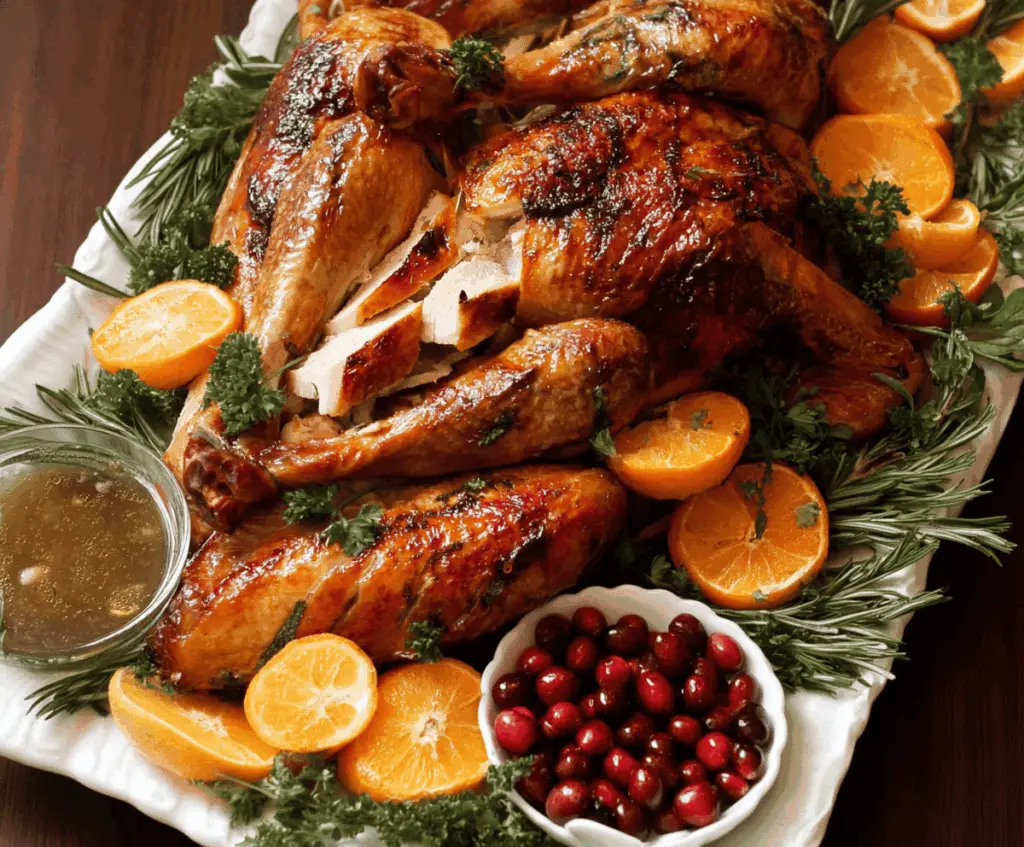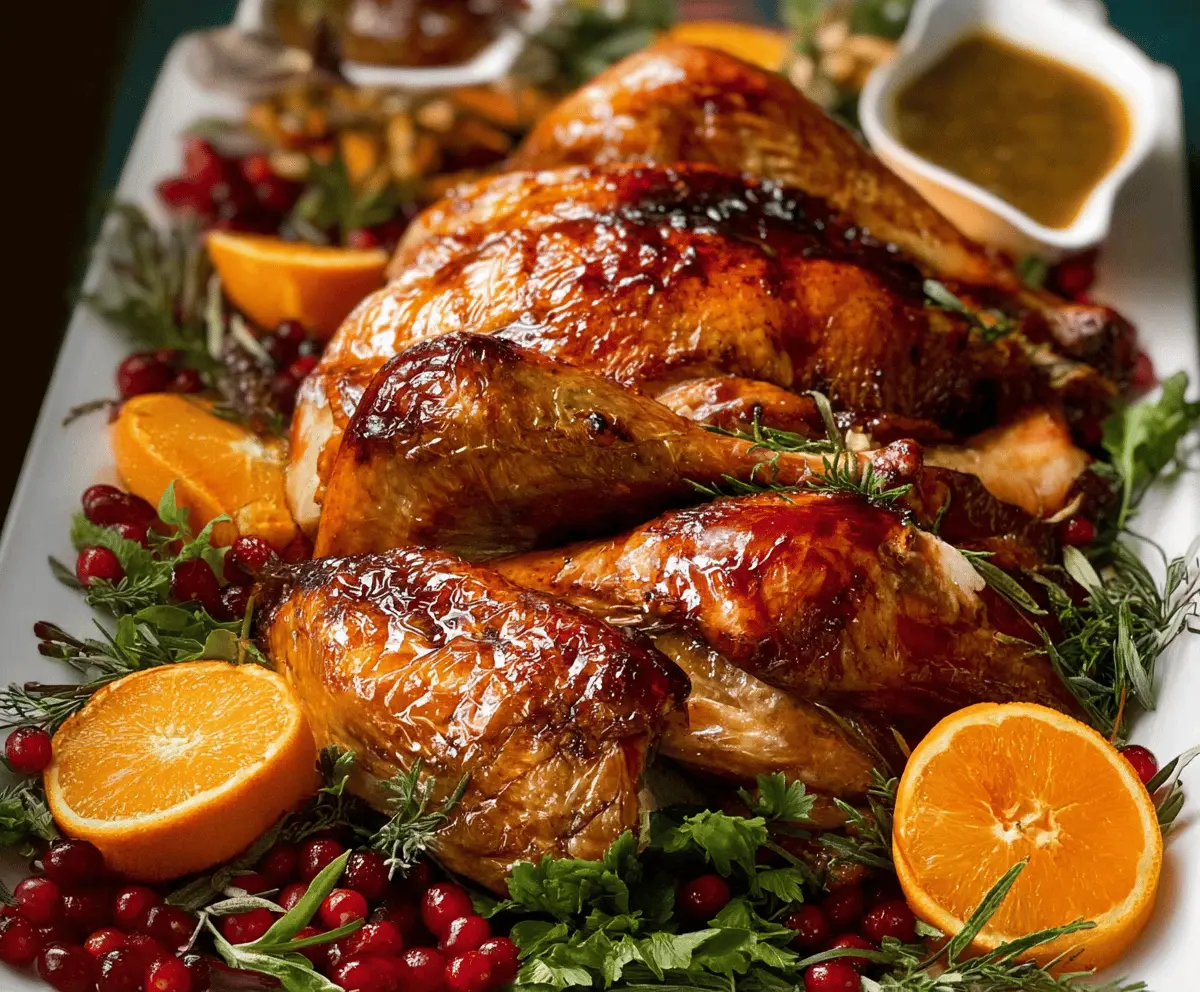
Juicy Brined Roast Turkey
Juicy Brined Roast Turkey is a classic holiday favorite that’s extra tender and full of flavor. The secret here is the brine—a simple mix of water, salt, and herbs—that helps…
Tip: save now, cook later.Juicy Brined Roast Turkey is a classic holiday favorite that’s extra tender and full of flavor. The secret here is the brine—a simple mix of water, salt, and herbs—that helps the turkey stay moist and juicy all the way through roasting. The skin crisps up beautifully, while the meat stays soft and succulent, making every bite a treat.
I love making this turkey when family comes over because it’s almost foolproof and always gets compliments. Taking the time to brine the bird really pays off; it’s worth the extra step to get that perfect balance of seasoning and moisture. I usually brine it overnight, which means I can relax a bit on the day of cooking and still serve an impressive roast.
Serving this turkey with simple sides like roasted vegetables or mashed potatoes makes dinner feel special without too much fuss. I always look forward to the first slice when the skin crackles and the meat is so tender it practically melts. It’s a recipe I’ll keep coming back to for many celebrations to come!
Key Ingredients & Substitutions
Turkey: A 12 to 14-pound whole turkey works well for roasting and brining. If you prefer smaller portions, a turkey breast can also be brined and roasted using the same method.
Kosher Salt & Sugar: These are essential for the brining process to draw moisture into the meat. If kosher salt isn’t available, use sea salt, but reduce the quantity slightly.
Fresh Herbs: Rosemary and thyme add nice aroma and flavor. If fresh isn’t available, dried herbs can be used but in smaller amounts since they’re more concentrated.
Orange & Onion: These provide subtle citrus brightness and depth. If you don’t have orange, lemon or lime halves work fine as a substitute.
Chicken Broth: Used for basting to keep the turkey moist. You can use vegetable broth or water if you prefer a lighter option.
Butter: Melting butter and brushing it on the skin helps with browning and crispiness. Olive oil can be a good alternative if you want a dairy-free option.
How Do You Get a Juicy, Flavorful Turkey without Dry Meat?
Brining is the key! It involves soaking the turkey in a salty, herby liquid to lock in moisture and infuse flavor. Here’s how to do it right:
- Make sure the brine is very cold before adding the turkey to prevent bacteria growth.
- Fully submerge the turkey in the brine. If needed, use a weight to keep it underwater.
- Brine the turkey for 12 to 24 hours depending on size. Too long can make the meat too salty.
- After brining, rinse the turkey well and pat it dry to help the skin crisp up when roasting.
- Roast at a moderate temperature (325°F) and baste occasionally with broth to maintain moisture.
- Use a meat thermometer to check doneness—remove the turkey at 165°F internal temperature to keep it juicy.
- Rest the turkey after roasting. This step allows the juices to settle, so the meat stays moist when carved.
Equipment You’ll Need
- Large stockpot or brining bag – big enough to hold the whole turkey and brine so it can soak evenly.
- Roasting pan with rack – keeps the turkey elevated for even cooking and lets air circulate under the bird.
- Instant-read meat thermometer – helps you check the turkey’s internal temperature for perfectly cooked, juicy meat.
- Basting brush or spoon – makes it easy to coat the turkey skin with butter and baste with pan juices.
- Kitchen twine – useful for tucking wings and legs securely to help the turkey cook evenly.
Flavor Variations & Add-Ins
- Swap fresh rosemary and thyme for sage and oregano for a slightly earthier, woodsy flavor.
- Add apple slices or pears to the brine for a gentle, sweet fruitiness that pairs nicely with turkey.
- Rubs like smoked paprika or garlic powder on the skin before roasting add a bold, smoky kick.
- Stuff the cavity with lemon halves and fresh herbs (like thyme and sage) for extra aroma and fresh citrus notes.
How to Make Juicy Brined Roast Turkey
Ingredients You’ll Need:
For The Brine:
- 1 cup kosher salt
- ½ cup granulated sugar
- 1 gallon cold water
- 4 sprigs fresh rosemary
- 4 sprigs fresh thyme
- 2 bay leaves
- 1 tablespoon black peppercorns
- 1 orange, halved
- 1 onion, quartered
- 8 cloves garlic, smashed
For The Turkey:
- 1 (12 to 14-pound) whole turkey, thawed if frozen
- 4 cups low-sodium chicken broth (for basting and gravy)
- ¼ cup unsalted butter, melted
For Garnish and Serving:
- Fresh parsley and rosemary sprigs
- Fresh cranberries
- 2 oranges, sliced
Time Needed:
You’ll need about 15 minutes to prepare the brine and turkey, plus 12 to 24 hours to brine the bird in the fridge. Roasting time is about 3 to 3.5 hours depending on the size of your turkey. Don’t forget to rest the turkey for 20 minutes after roasting before carving and serving.
Step-by-Step Instructions:
1. Prepare the brine:
Start by combining kosher salt, sugar, and cold water in a large pot. Stir until the salt and sugar dissolve. Add the fresh rosemary, thyme, bay leaves, peppercorns, orange halves, quartered onion, and smashed garlic. Chill the brine in the refrigerator until it’s very cold—this helps keep your turkey safe when it soaks.
2. Brine the turkey:
Remove the giblets from your turkey and pat the bird dry with paper towels. Place the turkey in a large container or a brining bag. Pour the cold brine over the turkey, making sure the bird is fully covered. Refrigerate the turkey for 12 to 24 hours to let all those flavors soak in and keep the meat juicy.
3. Prepare the turkey for roasting:
Take the turkey out of the brine and rinse it inside and out with cold water. Dry it thoroughly with paper towels. Let the turkey sit at room temperature for about an hour to take off the chill. Meanwhile, preheat your oven to 325°F (163°C) and place a roasting rack inside your pan.
4. Roast the turkey:
Put the turkey breast-side up on the rack. Brush the melted butter all over its skin to help it brown and crisp nicely. Tuck the wing tips underneath the bird’s body to avoid burning. Pour 2 cups of chicken broth into the bottom of the roasting pan to add moisture during cooking.
5. Cook the turkey:
Roast the turkey, basting now and then with pan juices. Add more broth if the pan gets dry. Roast until an instant-read thermometer in the thickest part of the thigh reads 165°F, which usually takes about 3 to 3.5 hours. If the skin starts to look too dark, tent the turkey loosely with foil to prevent burning.
6. Rest the turkey:
Once it’s out of the oven, let the turkey rest for at least 20 minutes. This makes sure the juices settle so the meat stays moist and tender when you carve it.
7. Carve and serve:
Carve your turkey and arrange the slices on a large platter. Garnish with fresh parsley, rosemary sprigs, orange slices, and fresh cranberries for a beautiful presentation. Serve with pan gravy made from those delicious roasting juices if you like.
Can I Brine a Frozen Turkey?
It’s best to fully thaw your turkey before brining to ensure the brine penetrates evenly. Thaw the turkey in the fridge for several days, allowing roughly 24 hours for every 4-5 pounds.
How Long Can I Brine the Turkey?
You can brine for 12 to 24 hours. Brining too long may make the meat overly salty or soft, so sticking within this timeframe is ideal for juicy, flavorful results.
Can I Use Table Salt Instead of Kosher Salt?
Table salt is finer and saltier than kosher salt, so use about half the amount if substituting. This helps avoid over-salting your turkey during the brine.
How Do I Store Leftover Turkey?
After carving, store any leftovers in an airtight container in the fridge for up to 3-4 days. Reheat gently to keep meat moist, either in the oven with foil or in the microwave with a little broth.

